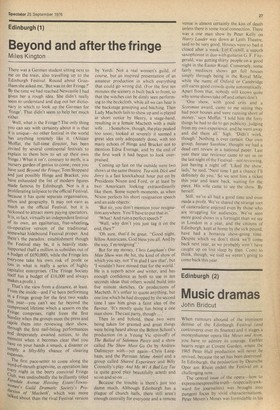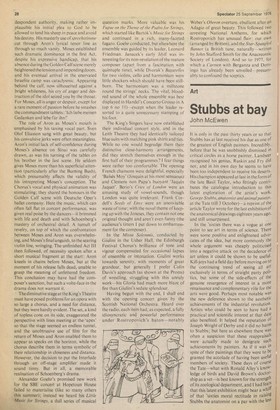Edinburgh (2)
Music dramas
John Bridcut
When rumours abound of the imminent demise of the Edinburgh Festival (and controversy over its finance) and it stages a moneyshunner opera like Moses and Aron, you have to admire its courage. Feebler hearts reign at Covent Garden, where the 1965 Peter Hall production will never be revived, because the set has been destroyed. In Edinburgh, the production by Deutsche Oper am Rhein ended the Festival on a challenging note. The central issue of the opera—how to express inexpressible truth—(especially awkward for journalists) was brought into pungent focus by vivid characterisations. Peter Meven's Moses was formidable in his
despondent authority, making rather implausible his initial plea to God to be allowed to tend his sheep in peace and avoid his destiny. His masterly use of sprechstininte cut through Aron's lyrical tenor line as through so much vanity. Moses established such dramatic dominance in the first Act, despite his expressive handicap, that his absence during the Golden Calf scene merely heightened the tension and impend ing doom, and his eventual arrival in the enervated Israelite camp was cataclysmic. Appearing behind the calf, now silhouetted against a bright whiteness, his cry of anger and destruction of the idol seized you by the throat. For Moses. all is anger or despair, except for a rare moment of passion before he smashes the commandment tablets: 'Ich I iebe meinen Gedanken and lebe fur ihn!'
The role of Aron as Moses's mouth is emphasised by his taxing vocal part. Sven Olof Eliasson sang with great beauty, but his convulsive jerks were often meaningless. Aron's initial lack of self-confidence during Moses's absence on Sinai was carefully drawn, as was his turning of the tables on his brother in the last scene. He seldom gives Moses more than his superficial attention (particularly after the Burning Bush), which presumably affects the validity of his intrepreting Moses's conception. The Chorus's vocal and physical animation was stimulating; they shared the honours in the Golden Calf scene with Deutsche Oper's ballet company. Here the music, which can often fall flat in concert performance, was given real poise by the dancers—it brimmed with life and death and with Schoenberg's mastery of orchestral detail. A tumult of revelry, on top of which the confrontation between Moses and Aron was overwhelming, and Moses's final anguish, to the searing violin line, wringing. The unfinished Act III then followed, of necessity spoken after a short musical fragment at the start: Aron kneels in chains before Moses, but at the moment of his release falls dead, unable to grasp the meaning of unfettered freedom. This conclusion may have had the composer's sanction, but such a volte-face in the drama does not warrant it.
The diminutive stage at the King's Theatre must have posed problems for an opera with so large a chorus, and a need for distance, but they were hardly evident. The set, a kind of topless cone on its side, exaggerated the perspective with lines meeting at the `apex' so that the stage seemed an endless tunnel, and the unobtrusive use of film for the return of Moses and Aron enabled them to appear as specks on the horizon, while the chorus describe them in terms symbolic of their relationship in closeness and distance. However, the decision to put the Interlude through an off-stage amplifier made it sound tinny. But in all, a memorable realisation of Schoenberg's drama.
Alexander Goehr's promised new work for the SBE concert at Hopetoun House failed to materialise (like so many others this summer); instead we heard his Little Music for Strings, a dull series of musical question marks. More valuable was his Fugue on the Theme of the Psalm /or Strings, which started like Bartok's Music,Thr Strings and continued in a rich, many-faceted fugato. Goehr conducted, but elsewhere the ensemble was guided by its leader, Leonard Friedman. Janacek's early OW was interesting for its non-revelation of the mature composer (apart from a fascination with quintuple time), while Dvorak's Bagatelles for two violins, cello and harmonium were little shockers which should have been stillborn. The harmonium was a millstone round the strings' necks. The vital, bloodred sound of the whole ensemble was best displayed in Handel's Concerto Grosso in A (op 6 no 11)—except when the leader resorted to a quite unnecessary stamping of his foot.
The King's Singers have now established their individual concert style, and in the Leith Theatre they had identically tailored blue suits with matching pink shirts and ties. While no one would begrudge them their distinctive close-harmony arrangements, did they stretch themselves enough in the first half of their programmes? I fear things were rather too comfortable. The opening French chansons were delightful, especially 'Baises Moy' (Josquin at his most sensuous) and Clemens non Papa's buoyant 'Jaquin Jaquet'. Berio's Cries of London were an amusing study of vowel-sounds, though London was quite irrelevant. Frank Cordell's Seeds of Envy were an unenviable waste of time; with the novel theme of keeping up with the Joneses, they contain not one original thought and aren't even funny (the audience's titters I put down to embarrassment for the composer).
In the Missa Solemnis, conducted by Giulini in the Usher Hall, the Edinburgh Festival Chorus's brilliance of tone and vigour compensated for occasional lapses of ensemble or intonation. Giulini works towards serenity, with moments of great grandeur, but generally I prefer Colin Davis's approach (as shown at the Proms) of wrestling, struggling with this unruly work—his Gloria had much more blaze of fire than Giulini's sedate splendour.
Having begun with the end, I shall end with the opening concert given by the Scottish National Orchestra. Heard over the radio, each item had, as expected, a fully idiosyncratic and powerful performance under Rostropovich's baton—notably
Weber's Oberon overture, ebullient after an Adagio of great beauty. This followed two arresting National Anthems, for which Rostropovich has unusual flair: our own (arranged by Britten), and the Star-Spangled Banner (a British tune, naturally—written by John Stafford Smith for the Anacreontic Society of London). And so to 1977, for which a Carmen with Berganza and Domingo has already been unveiled—presumably to confound the sceptics.



































 Previous page
Previous page